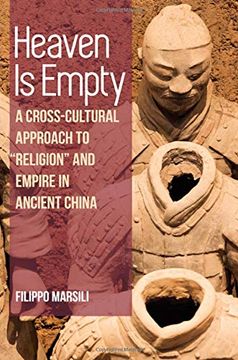Compartir
Heaven is Empty: A Cross-Cultural Approach to "Religion" and Empire in Ancient China (Suny Series in Chinese Philosophy and Culture) (en Inglés)
Filippo Marsili (Autor)
·
State University Of New York Press
· Tapa Dura
Heaven is Empty: A Cross-Cultural Approach to "Religion" and Empire in Ancient China (Suny Series in Chinese Philosophy and Culture) (en Inglés) - Filippo Marsili
$ 99.00
$ 134.36
Ahorras: $ 35.36
Elige la lista en la que quieres agregar tu producto o crea una nueva lista
✓ Producto agregado correctamente a la lista de deseos.
Ir a Mis ListasSe enviará desde nuestra bodega entre el
Lunes 27 de Mayo y el
Martes 28 de Mayo.
Lo recibirás en cualquier lugar de Estados Unidos entre 1 y 3 días hábiles luego del envío.
Reseña del libro "Heaven is Empty: A Cross-Cultural Approach to "Religion" and Empire in Ancient China (Suny Series in Chinese Philosophy and Culture) (en Inglés)"
Offers a new perspective on the relationship between religion and the creation of the first Chinese empires.Heaven Is Empty offers a new comparative perspective on the role of the sacred in the formation of China’s early empires (221 BCE–9 CE) and shows how the unification of the Central States was possible without a unitary and universalistic conception of religion. The cohesive function of the ancient Mediterranean cult of the divinized ruler was crucial for the legitimization of Rome’s empire across geographical and social boundaries. Eventually reelaborated in Christian terms, it came to embody the timelessness and universality of Western conceptions of legitimate authority, while representing an analytical template for studying other ancient empires. Filippo Marsili challenges such approaches in his examination of the reign of Emperor Wu of the Han (141–87 BCE). Wu purposely drew from regional traditions and tried to gain the support of local communities through his patronage of local cults. He was interested in rituals that envisioned the monarch as a military leader, who directly controlled the land and its resources, as a means for legitimizing radical administrative and economic centralization. In reconstructing this imperial model, Marsili reinterprets fragmentary official accounts in light of material evidence and noncanonical and recently excavated texts. In bringing to life the courts, battlefields, markets, shrines, and pleasure quarters of early imperial China, Heaven Is Empty provides a postmodern and postcolonial reassessment of “religion” before the arrival of Buddhism and challenges the application of Greco-Roman and Abrahamic systemic, identitary, and exclusionary notions of the “sacred” to the analysis of pre-Christian and non-Western realities.
- 0% (0)
- 0% (0)
- 0% (0)
- 0% (0)
- 0% (0)
Todos los libros de nuestro catálogo son Originales.
El libro está escrito en Inglés.
La encuadernación de esta edición es Tapa Dura.
✓ Producto agregado correctamente al carro, Ir a Pagar.

